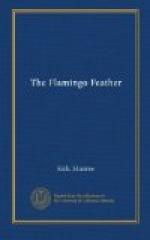HAS-SE IS HELD PRISONER
Saluting his commandant, the sergeant of the guard, who held the prisoner on the right, reported that this young savage had been seen skulking in the forest near the fort, and that, deeming his presence and movements very suspicious, he had sent a party of men to capture him. They had gone out by a rear gate, and, making a long detour, had surprised him just as he was making off through the underbrush, and after a sharp tussle had secured and brought him into the fort.
At the first appearance of his friend, Rene had started up with an exclamation of joy to go to him, but his uncle sternly bade him keep his seat. He obeyed, but scowled angrily at the soldiers, who still retained their hold of Has-se, as though fearful that if they let go he might in some mysterious way vanish from their sight.
Laudonniere commanded them to release their hold of the prisoner and to retire from the room, but to remain within call. They did so, and the young Indian, left to face the council, drew himself up proudly, and folding his arms, stood motionless. Rene tried in vain to catch his eye, that he might, by a sympathetic glance, assure him of his friendship; but the other betrayed no recognition of his presence, nor once looked in his direction. He was dressed in the full costume of a young warrior who occupied the honorable position of Bow-bearer to a great chief, and in his hair gleamed the Flamingo Feather that proclaimed the station in life to which he was born. His handsome figure, proud face, and fearless bearing caused the members of the council to regard him with approving glances, and it was with less of sternness in his tone than usual that, after the door was closed, Laudonniere said,
“Now, sir, explain to us the meaning of this sudden departure of thy people, and the reason of thine own action in thus acting the part of a spy upon us.”
With flashing eyes the young Indian answered in the French that he had learned of Rene:
“My name is Has-se. I am the son of a chief. My father and my people have been friendly to you and your people. This country is ours, and in it we go where we please when we are ready to go, and stay where we please when we are ready to rest from going. I have done nothing that I should be brought here against my will, and until I am set free I will answer no questions. Has-se has spoken.”
Rene’s face flushed with pleasure at this brave speech of his friend, and even Laudonniere admired the young Indian’s coolness and courage, but he nevertheless felt it his duty to maintain his dignity, and questioned him sternly. To all his questions however, Has-se remained dumb, absolutely refusing to open his lips. The expression, “Has-se has spoken,” with which he had ended his defiant speech, signified that he had said all that he had to say, and nothing should induce him to speak further unless his condition of being set at liberty were complied with.




